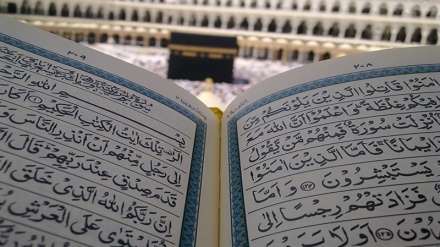Path towards Enlightenment (1034)
Welcome to our latest episode of “Path towards Enlightenment”, which is an endeavour to make you and us familiar with an easy and fluent explanation of God’s Final Scripture to all mankind, the holy Qur’an that was revealed to the Last and Greatest of all Messengers, Prophet Mohammad (blessings of God upon him and his progeny).
In our previous episode we completed explanation of “Surah Haaqqah” and today we take up explanation of the next Surah, that is, “Surah Ma’arej” – the number 70 in the serial order of compilation of the holy Qur’an.
It has 44 Ayahs and was revealed in Mecca, although according to exegetes, some of its Ayahs were revealed in Medina. The title of the Surah derives from the word “Ma’arej” mentioned in Ayah 3 regarding the places of ascent or lofty stations where by the permission of the Almighty Creator angels can ascent. The Surah focuses on the Day of Resurrection and warns the polytheists and disbelievers of the dire consequences of their lack of faith, while defining the characteristics of the peoples of Paradise and Hell. The opening Ayahs concern the sending down of torments in this world such as the one that befell a denier of the Divinely-designated Wilayah or Leadership of the Prophet’s Immaculate Cousin and Son-in-Law, Imam Ali ibn Abi Taleb (AS).
There are several merits in the regular recitation of this Surah.
Here we present you Ayahs 1, 2, 3, and 4:
“In the Name of Allah the Compassionate the Merciful –An asker asked for a punishment bound to fall
“Which none can avert from the faithless-
This from Allah, Lord of the lofty stations
“Whose angels and the Spirit (Gabriel) ascend to Him in a day whose span is fifty thousand years.”
These Ayahs point to the intransigence of some disbelievers who even after claiming to have accepted Islam continue to deny the manifest truth. The opening Ayah refers to a famous incident and the Divine Wrath that befell a hypocrite called Nu’man bin Hareth al-Fahri, who on hearing of the proclamation of Imam Ali (AS) as Vicegerent on Divine Commandment at the memorable gathering of Ghadeer-Khom, came to Medina and said to the Prophet:
“You commanded us to testify that there is no god but Allah and that you are the messenger of Allah. We obeyed you. You ordered us to say prayers five times a day and we obeyed. You directed us to pay zakat and we obeyed. You ordered us to observe fasts during Ramadan and we obeyed. Then you commanded us to perform pilgrimage to the Ka’ba and we obeyed. But you are not satisfied with all this and you raised your cousin by the hand and imposed him upon us as our master by saying: “Ali is the Mowla of whom I am Mowla”. Is this imposition from you or from Allah?"
The Prophet said: “By Allah Who is the only God, this is from Him, the Almighty, the All-Glorious.”
On hearing this Hareth turned back and proceeded towards his camel saying: “O Allah! If what Mohammad says is true then fling a stone from the sky upon me and make me suffer severe pain and torture!”
He had not yet reached his camel when a stone fell from above, struck him on his head, penetrated his body, and left him dead.
The Holy Qur’an makes a reference to this incident in order to serve as a warning to those who in spite of claim to be believers deny the manifest truth because of their hatred of facts and realities, even if it means Divine Commandments. Ayah 2 thus says that such torment is in store for the deniers of the manifest truth and none can avert it.
Ayah 3 refers to the source of such a torment, saying the affliction is from Allah, the Lord of the lofty heavens where, as is clear by the next Ayah, the angels and Gabriel swiftly ascend by His command in a day which is as long as 50 thousand years by our earthly measurements. They then swiftly return to implement Divine commandments.
From these ayahs we learn that:
- It is self-destruction to deny or oppose Allah’s commandment and the truthfulness of the Prophet.
- The All-Merciful Lord has given the intellect to differentiate right from wrong and granted us enough respite to repent and seek forgiveness, since there is no escape from Divine Punishment on the Day of Resurrection.
Now let us listen to Ayahs 5, 6 and 7 of Surah Ma’arej in conclusion of this week’s episode:
“So be patient, with a patience that is graceful.
“Indeed they see it to be far off,
“While We see it to be near.”
These Ayahs tell the Muslims to be patient and resistant vis-à-vis the hardships and the persecution by the pagan Arabs, without complaining or losing hope in Divine Mercy, because the fate of the faithless sealed even though they think punishment is far away, while it is very near. Their punishment, whether in the mortal life of the transient world or the Day of Judgement, is near and definitive.
. These Ayahs teach us that:
- We should not get tired or leave the course in the face of insults, accusations and mockery by opponents. We should rather be patient and have trust in Allah to push them back.
- The belief in the Day of Judgement makes one patient against hardships.
RM/AS/SS


